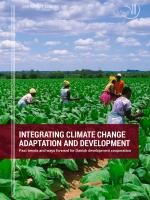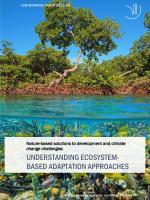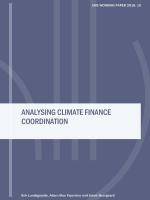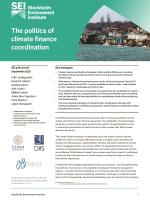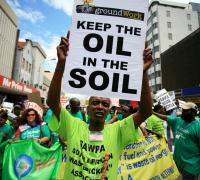Climate finance: It’s time for the climate funds to get serious on coordination
The mobilisation of climate finance to developing countries is a key theme at the ongoing COP26 negotiations. While it is critical to ensure that enough funds are allocated, it is equally critical to ensure that once funds are allocated, they are used and delivered effectively.
The global landscape of climate finance is however deeply fragmented, with a multitude of actors, overlapping mandates and competing agendas. This has prompted calls for especially the global climate funds to improve coordination. But so far, coordination has been reluctant and slow.
In this collaborative SEI policy brief, DIIS joins the Stockholm Environment Institute, University of Lund and The Peace Research Institute Oslo to discuss why climate finance is so poorly coordinated among the global climate funds, and what to do about it.
The brief focusses especially on two of the most prominent climate funds so far, namely the Green Climate Fund and the Climate Investment Funds. The lack of coordination between these funds is often explained as a question of resource constraints and technical management challenges.
However, behind this lies deeper political differences that relate to the different histories of the funds, their understanding of climate finance, and their mutual institutional competition. Rather than technical organisational challenges, the lack of progress in climate finance coordination thus relates to the deeper politics of how climate finance is governed and arranged at global and domestic levels.
To deal with coordination challenges, climate finance stakeholders should recognize their differences of interest and outlook more openly and address the underlying questions about the assignment of roles and responsibilities. This includes:
- Fund contributors and recipients should collaborate to develop clear guidance on how climate funds should relate to one another at a global level. Contributor governments should review the consistency of their modes of engagement with different funds and improve coordination within their own administrations.
- At the global level, the UNFCCC Standing Committee on Finance should initiate a consultation process that aims to identify the respective organizational strengths, the potential for differentiation and the opportunities for coordination among climate funds. This process should be framed broadly to account for the role of funds that fall outside of UNFCCC mandates.
- At the country level, national governments and development partners should review the compatibility of sector-focused development coordination forums with climate finance coordination objectives.
The policy brief is based on the collaborative “Share or Spare?” research project, coordinated by Lund University and funded by the Swedish Research Council.
DIIS Experts



